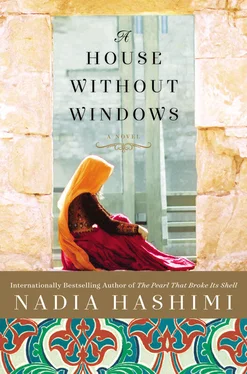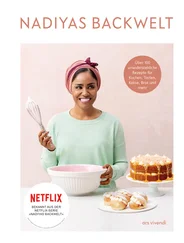“I’ve raised serious concern about the validity of the confession,” he said carefully. He’d already decided that he would use the press coverage in any way he could. If it meant pointing fingers at the muddied justice system, he would do just that.
“I see. And I’ve also heard that she was taken to a shrine to be treated for insanity. This is not at all standard procedure in a murder case. Was it your recommendation to take her to that shrine? How much longer will she be there?”
Yusuf undid the top button of his collar and peeled it away from the back of his neck, where beads of moisture made it cling to his skin.
“She’s not at a shrine,” he said simply. If Sultana wanted more information about the shrine, she would have to look for it elsewhere. He wasn’t about to paint his client as an insane person when it didn’t seem an insanity defense would get her anywhere.
“But she was at a shrine, a local one where a mullah engages in some fairly controversial treatment for the insane. Why was she taken there when we have medical facilities with trained professionals who could evaluate and treat her scientifically?”
“She is not at a shrine,” Yusuf repeated without elaborating.
“Where is she?” Sultana asked with great interest.
“She’s here at Chil Mahtab. We’re preparing our final statements for her case, and the judge should be issuing a ruling in the next two days.” Yusuf had been struggling with his final arguments, going through pages and pages of handwritten scrawl without satisfaction.
“And how do you think Qazi Najeeb will rule?”
“That’s a question for Qazi Najeeb,” Yusuf replied. “But my hope is that he will weigh all the factors in this complicated case and reach a fair conclusion for this mother of four young children. The sooner she can be returned to them, the better.”
“You maintain her innocence?”
“I do,” Yusuf affirmed.
“You’ve made a case that she is insane, from what I understand. Do you know that no one has ever been defended with an insanity plea in Afghanistan? This is quite unusual.”
“I’m aware, but the circumstances of this case are unusual and Qazi Najeeb has been careful about sticking closely to the procedural and penal codes of Afghanistan. We have followed the law precisely to be sure that Khanum Zeba is receiving a fair trial. Just because there’s no precedence doesn’t make it wrong. Lots of things are happening for the first time in our country.”
“You’re speaking to the only female journalist willing to cover this province. I don’t think you have to tell me that.”
Yusuf’s lips curled in a smile as he pulled at a stray thread on the strap of his messenger bag.
“When are you planning on printing this story?” he asked.
“When I feel I have enough to go on. As of right now, there’s a woman accused of murdering her husband and her American lawyer is making claims that she is not guilty because she’s insane. Not a bad lead, is it? Still, I want to include everything I can. Sometimes, crime in Afghanistan is more about rumor and gossip than anything else.”
“There’s a lot of truth to that.” Yusuf sighed.
“But I don’t want to be part of the gossip. Rumors can get a woman lynched in the streets. I want facts, and facts might just help your case,” she suggested. “Anything I print could potentially sway the courts to act on the right side of the law here. Our reports sometimes catch the attention of the foreign media. A few international eyes on your case, and the pressure is on.”
“Ah, so you’re really calling to do me a favor!” Yusuf chuckled.
“I don’t do favors. I just report the news,” Sultana corrected. “Can you tell me about this woman’s husband? Do you have any idea why she or someone else may have wanted to kill him?”
“There are rumors, but nothing I can commit to. And again, I’m insisting on my client’s innocence. It’s unusual for a wife to kill her husband. It’s much more common the other way around.”
“Again,” Sultana said pointedly, “something an Afghan woman doesn’t need to be told.”
Yusuf felt a rising indignation in his chest. He didn’t appreciate being painted as the stereotypical Afghan man. He took a look at the blank forms on the table in front of him, picking up a notebook and using it to fan himself.
“Look, I’ve got to go. There’s nothing more I can tell you for now. Good luck with your story,” he said quickly.
“Yusuf, just one more thing to ask. Did Khanum Zeba ever—”
But Yusuf cut her off, pressing his thumb to the red button on the cell phone while her question dangled on the line.
ZEBA’S CLOTHES, A SMALL STACK THAT BARELY USED UP ONE shelf of the metal locker in their cell, had been freshly washed and folded. The sheets of her bed were stiff with starch and neatly tucked under the corners of her mattress. There was a red silk carnation and a small prism keychain on her pillow. The prism had a red heart at its center and spread fractured light in every direction as Zeba turned it over in her palm.
She’d returned to Chil Mahtab two hours ago but was just getting to her room now. Swarmed by her fellow prisoners in the hallway, she sensed that this place had become a shrine unto itself. It unnerved her, the way the women smiled at her, the way they offered her trinkets, the way their fingertips touched her body as if she were some kind of mystic. And Asma was right. Several women had tattooed Zeba’s name on their arms or backs either because she had saved them or because they hoped that she would. Some believed that the four letters of her name inked into their skin was a talisman in itself. The anticipation of what she could do thrived and spread like vines through the stifling hallways of Chil Mahtab.
Latifa had hugged her, an awkward pressing of her thick body against Zeba’s gaunt frame.
“Oh God, you’ve wasted away to nothing! It must have been so awful. You should eat something. Nafisa, run down to the kitchen and get her some food!”
Nafisa had seen Zeba in the hallway but had patiently waited for the crowd to clear before she put her arms around her cellmate. She’d been spooked by the idea that Zeba had been deemed insane enough to be shackled to a shrine. In the cell, she’d kept her attention on the television. She was watching the news from Kabul: a young man and woman sitting behind a long desk reporting stories of suicide bombers and cricket game results. She was about to tell Latifa to get the food herself when she took a longer look at Zeba. Her jaw snapped shut before she could protest being bossed around.
“Oh, Zeba- jan !” Nafisa exclaimed. “I’ll grab you something right away. You do look pretty terrible.”
“It’s all right, Nafisa.” Zeba motioned for her to stay where she was. “I had some food on the way here. My stomach still feels bloated from it.”
“Hmph.” Latifa smirked, eyeing Zeba’s thin frame skeptically. “You don’t look the least bit bloated to me.”
Zeba did not know what to do with herself. She wanted to stand and stretch, because for nearly three weeks she hadn’t been able to. She wanted to walk through the yard and put her legs to use again. She wanted to lie down on her mattress and sleep without worrying about scorpions or hearing the rattling of chains.
Zeba was relieved to be back in prison, a feeling that made her insides sour. She realized she did not have much to hope for. Yusuf was struggling with his defense, and although she had not meant to, Zeba had begun to think it might actually be possible to find a way out of this predicament and be returned to her children. There were moments when she considered telling Yusuf and the judge and the prosecutor the unfiltered truth of what happened on that day. She could tell them that she had not killed her husband. The truth, in its entirety, could not possibly hold her responsible.
Читать дальше











